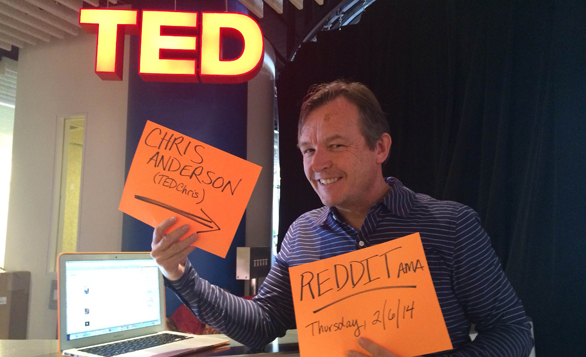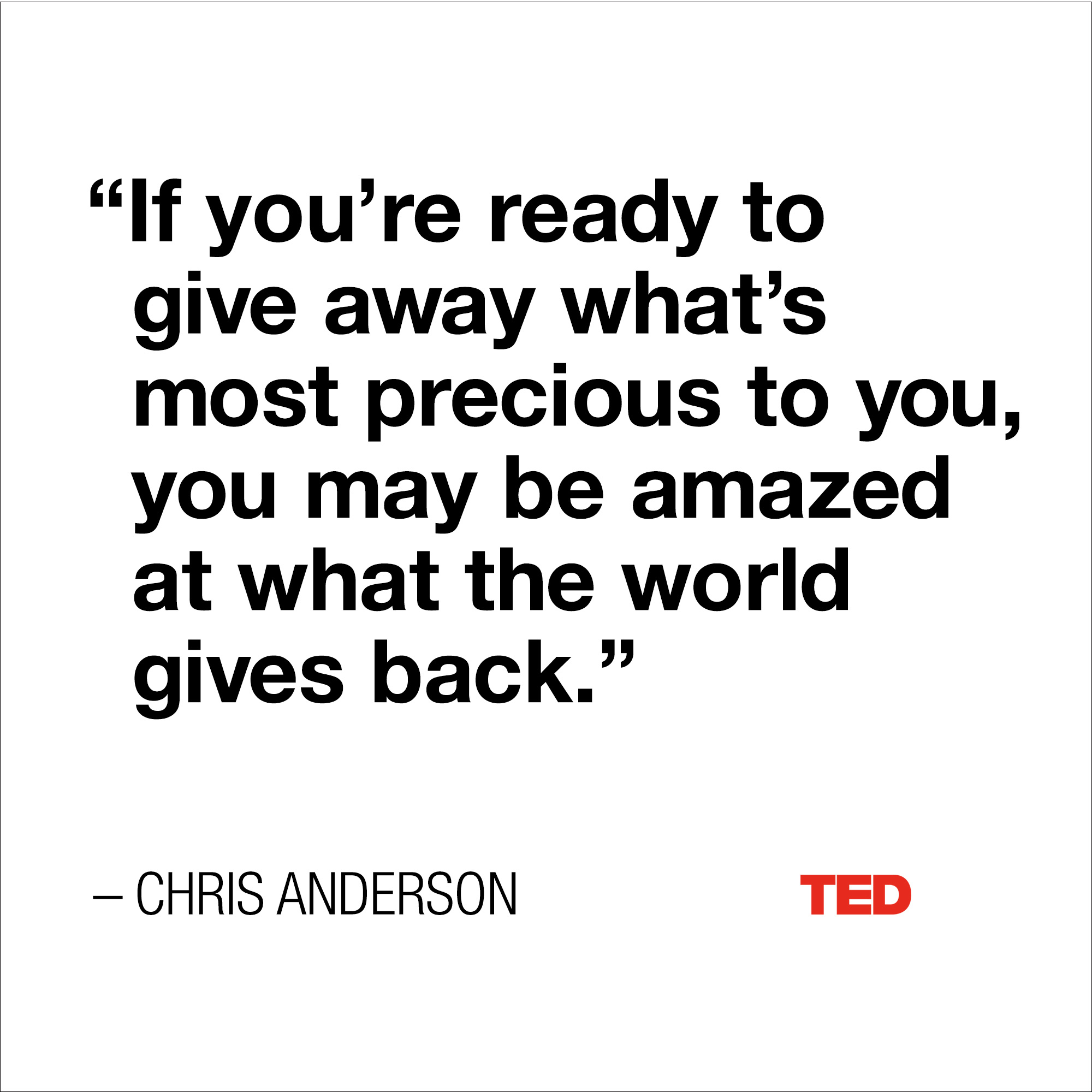 Yesterday, our curator Chris Anderson took an hour to answer rapid-fire questions in a Reddit AMA, sandwiched between AMAs with Matt Damon and Kevin Smith no less. Redditors asked Chris about everything from his dream speakers to the charge that TED has censored speakers. Below, highlights of the conversation.
Yesterday, our curator Chris Anderson took an hour to answer rapid-fire questions in a Reddit AMA, sandwiched between AMAs with Matt Damon and Kevin Smith no less. Redditors asked Chris about everything from his dream speakers to the charge that TED has censored speakers. Below, highlights of the conversation.
Timbenz asked:
What category is hardest to get decent speakers? Sports? Politics? Finance? Other?
Chris answered:
Women. We try at least twice as hard to recruit women, and still have fewer than we would wish … only about a third. But it’s getting better. My colleague June Cohen spoke about the issue here.
Other categories … let’s see. Politics is tricky. Not interested in the kind of political debate we see most days in mainstream media. We do try to find politicians who can present an outside-the-box framing of an issue and could certainly have more of those at TED.
Airplanesscareme asked:
The most viewed TED talk of all time is Ken Robinson’s: How school kills creativity, which has been watched close to 25 million times. He shares a lot of great ideas that I believe could help improve the school system, but still 8 years after the talk I have yet to see any kind of implementation of his ideas in the way we teach in schools. What can we do as citizens to help take the ideas that we learn through TED and turn them into actual change?
Chris answered:
He’s certainly inspired a lot of people to chuck in their careers and devote their lives to education reform. And his call for greater attention to creativity in schools is more relevant now than ever. We’re entering a world where AIs will take away a lot of traditional jobs — and creativity is what humans still own. It should be at the core of education. I actually see a lot of great things happening… from MOOCs to Khan Academy to our own TED-Ed initiative. What can citizens do? I think there’s a different answer to that question for every single person. You know your own skillset better than anyone. You tell me. What can YOU do?
Clawfrank asked:
Have there been any TED talks that have resulted in actual change?
Chris answered:
Most TED speakers would say the release of their talk online has dramatically increased their impact in the world. But I actually think TED’s most significant impact happens at individual viewer level. People who watch TED Talks for a while end up shifting their view of the future. Instead of thinking of it as an unstoppable force they are potential victims of, they think of themselves as perhaps able to play a part in shaping it. So I guess I would say the impact is measured in literally millions of individual stories. We blogged some specific examples here, but there are countless more.
Timbenz asked:
This is more a request than a question: Please shake up the format. While I can live with 18-minute length, stylistically the talks are blurring into one another. Intonation, structure, etc have all become wearyingly homogenous.
Chris answered:
Really interesting point. One thing we’ve noticed is that when the talks exploded online, some speakers started trying to game the format, so to speak. We’ve become pretty sensitive to that. In talks recorded in the last year at our main conferences, it’s much less evident. We’re looking for substance over style, and really encourage speakers to give the talk their own authentic way.
Timbenz asked:
Top three realistic “gets” you wish would agree to do TED talks, but haven’t yet.
Chris Anderson answered:
Edward Snowden. The Pope. A 12-year-old girl from a slum in Mumbai who can really … REALLY … explain to us why we need to let her help shape the future.
To which Jeffy 29 responded:
You almost hit a Reddit triple. The correct answer was Jennifer Lawrence. :)
While Chris was typing, TED staffer and frequent Redditor Eric Mueller gave the Reddit community a behind-the-scenes tour of the TED office. Watch that below:
[youtube=http://www.youtube.com/watch?v=TpzadDIVMBc&w=586&h=330]
Meanwhile, KorranHalcyon asked:
What is the deal with TED banning certain talks? Why have the guests only to bury them?
Chris Anderson asked:
There’s a lot of misinformation out there on this one. There were two talks by Graham Hancock and Rupert Sheldrake that we were accused of censoring. Simply not true. Long story … some of which I wrote about here in this note to Deepak Chopra. Nick Hanauer was another storm in a teacup. My version here … and actually there was a huge Reddit discussion raised by that here. In general, it’s fair to say the Internet is allergic to censorship. If some one claims censorship online, it’s like shouting fire in a movie theater. People get hurt, whether or not it’s true.
Crossjamin asked:
Obvious question, but what are your thoughts on Benjamin Bratton’s “We need to talk about TED” talk and all of the media coverage it’s gotten? It certainly shows how large TED’s cultural influence has become, but has it become too big and popular for its own good?
Chris Anderson answered:
It’s ironic that Bratton talk criticizing TED’s lack of nuance was itself given at a TEDx event. It raised some decent questions though. This was my response to it. To my mind, it was based on a misconception of what TED is trying to do.
Haronnenjr asked:
Chris, TED is seen as an exclusive club. What can we do to make the rich more aware income inequality is ultimately going to be in their disadvantage?
Chris answered:
That’s actually the question I’m personally thinking about more than any other right now. A 2-minute answer here won’t work … but this will be a big theme at our upcoming conference. I’ll try to post links later to a couple of relevant talks we already ran.
Leontes asked:
Do you think that TEDx has diluted the brand at all?
Chris answered:
No. It has massively, massively amplified the brand. TEDx is where we give people a free license to organize their own TED-like event locally. Are there some truly terrible TEDx talks out there? Yes there are. But the vast majority have amazed us by how much energy, passion and brilliance goes into them. There are now around 7 TEDx events held every day. That’s pretty incredible. TEDx organizers have packed out the Sydney Opera House and the European parliament. And we’ve seen TEDx events in the slums around Nairobi. Also TEDxBaghdad, TEDxMogadishu, etc, etc. It’s a simple rule of the connected age. If you’re ready to give away what’s most precious to you, you may be amazed at what the world gives back.
Polismouse asked:
In what ways has the development/rapid growth of TED surprised you the most? Is the content roughly what you imagined it would be?
Chris answered:
I guess the biggest surprise was that LECTURES posted on the internet lasting as long as 18 minutes actually started to go viral. We really didn’t see that coming. Our first experiment putting talks out there for free happened in 2006, and the response to them kind of forced us to flip the organization on its head. We’re no longer just a conference org — the website, and its ability to share talks far and wide, became TED’s heart and soul.
F4E7 asked:
Hey Chris, what’s your favourite TED Talk?
Chris answered:
Ooooh. So many. Here’s a less known talk from a remarkable outside-the-box physicist David Deutsch.
Pierovera asked:
In your opinion, what has been TED’s greatest achievement?
Chris answered:
We don’t think that way yet. It’s still early days. But it is amazing — and thrilling — to discover how many curious people there are in the world. The meme about culture being dumbed down by the internet is overplayed.
Uberlad asked:
What’s your very best life advice?
Chris answered:
DON’T (always) follow your passion. I really think that was terrible advice offered by a generation of hippy parents. I expanded on this at the end of this commencement talk I gave to some architects.

Comments (6)
Pingback: Everything I need to know I learned from TED | Andraz Tori Blog
Pingback: You asked Chris Anderson anything. Here are the highlights.